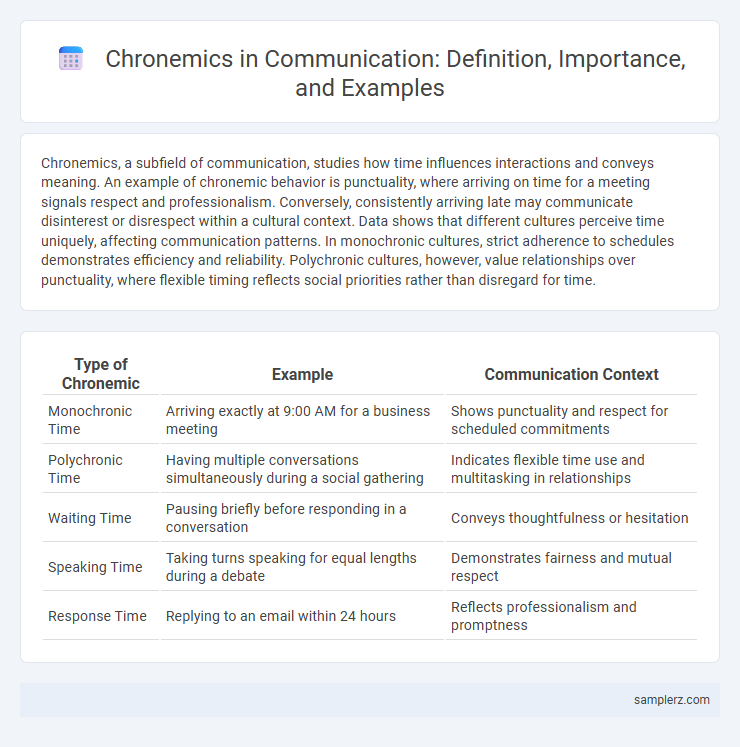Chronemics, a subfield of communication, studies how time influences interactions and conveys meaning. An example of chronemic behavior is punctuality, where arriving on time for a meeting signals respect and professionalism. Conversely, consistently arriving late may communicate disinterest or disrespect within a cultural context. Data shows that different cultures perceive time uniquely, affecting communication patterns. In monochronic cultures, strict adherence to schedules demonstrates efficiency and reliability. Polychronic cultures, however, value relationships over punctuality, where flexible timing reflects social priorities rather than disregard for time.
Table of Comparison
| Type of Chronemic | Example | Communication Context |
|---|---|---|
| Monochronic Time | Arriving exactly at 9:00 AM for a business meeting | Shows punctuality and respect for scheduled commitments |
| Polychronic Time | Having multiple conversations simultaneously during a social gathering | Indicates flexible time use and multitasking in relationships |
| Waiting Time | Pausing briefly before responding in a conversation | Conveys thoughtfulness or hesitation |
| Speaking Time | Taking turns speaking for equal lengths during a debate | Demonstrates fairness and mutual respect |
| Response Time | Replying to an email within 24 hours | Reflects professionalism and promptness |
Understanding Chronemics: The Role of Timing in Communication
Chronemics examines how the use of time influences communication, such as punctuality signaling respect or lateness implying disrespect in professional settings. In cross-cultural communication, monochronic cultures prioritize schedules and deadlines, whereas polychronic cultures view time flexibly, affecting interaction dynamics. Understanding these timing behaviors enhances clarity, reduces misunderstandings, and improves interpersonal and organizational communication effectiveness.
Punctuality as a Cultural Indicator
Punctuality serves as a key chronemic indicator in communication, reflecting cultural values surrounding time management and respect. In cultures like Germany and Japan, strict adherence to scheduled times signifies professionalism and reliability. Conversely, in regions such as Latin America and the Middle East, flexible timing often prioritizes relationship-building over rigid punctuality norms.
The Impact of Response Delays in Digital Communication
Response delays in digital communication significantly affect perceived urgency and relational dynamics, with studies showing that timely replies within 15 minutes often enhance trust and collaboration. Prolonged response times, exceeding 24 hours, can lead to misunderstandings, decreased engagement, and erosion of professional credibility. Chronemic factors, such as response latency, directly influence message interpretation and communication effectiveness in virtual environments.
Scheduling and Time Management in Professional Settings
Chronemics in professional settings highlights how precise scheduling and time management reflect organizational efficiency and respect for colleagues' availability. Punctual meetings, strict deadlines, and synchronized work hours convey commitment and enhance productivity. Variations in time perception across cultures impact negotiation tactics and project coordination, emphasizing the need for adaptive communication strategies.
The Significance of Pauses and Silence During Conversations
Pauses and silence in conversations serve as powerful chronemic indicators that influence communication flow and meaning. Strategic timing of these pauses allows speakers to emphasize points, convey emotions, and provide listeners with cognitive processing time. Effective use of silence enhances message clarity, signals respect, and fosters deeper interpersonal connections by creating space for reflection and response.
Turn-Taking Timing in Group Discussions
Turn-taking timing in group discussions reflects crucial chronemic cues where pauses and overlaps signal speakers' intent and dominance. Effective communication depends on managing these temporal patterns to ensure balanced participation and minimize interruptions. Studies show that groups with well-regulated turn-taking timing demonstrate higher collaboration and decision-making efficiency.
Early vs. Late Arrivals: Interpreting Social Meanings
Early arrivals in social settings often signify eagerness, respect, or high interest, whereas late arrivals can communicate disregard, casualness, or a power dynamic. Cultural norms heavily influence whether promptness or tardiness is socially acceptable, shaping interpersonal perceptions. These variations in timing convey subtle messages that impact relationship building and social interpretation in communication.
Deadline Sensitivity and Message Urgency
Deadline sensitivity in chronemics influences communication by dictating the urgency with which messages are conveyed and responded to, often prioritizing timely completion of tasks. Message urgency impacts the allocation of time, emphasizing immediate attention and swift decision-making to meet deadlines effectively. Both factors shape interpersonal and organizational communication dynamics, optimizing workflow efficiency and reducing miscommunication.
Chronemics in Cross-Cultural Communication
Chronemics, the study of time in communication, varies significantly across cultures, influencing punctuality, pace of conversation, and negotiation styles. In monochronic cultures such as the United States and Germany, strict adherence to schedules reflects respect and efficiency, while polychronic cultures like Mexico and Arab nations prioritize relationships over rigid timing, often valuing flexibility. Understanding these chronemic differences enhances cross-cultural communication by reducing misunderstandings related to time perception and behavioral expectations.
The Influence of Timing in Nonverbal Messaging
The influence of timing in nonverbal messaging is evident through chronemics, which studies how time affects communication. For example, pausing before responding during a conversation can convey thoughtfulness or hesitation, impacting the listener's perception. Similarly, punctuality signals respect and reliability, shaping interpersonal dynamics and trust.

example of chronemic in timing Infographic
 samplerz.com
samplerz.com